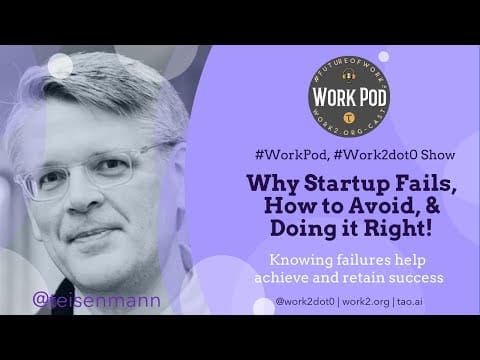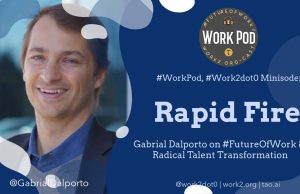In this conversation, Thomas Eisenmann discussed the complicated world of startup failures. Tom discussed various failures and what are some ways businesses could have done right. This is a great conversation for anyone seeking to understand failures and how to avoid them.
Bio:
Tom Eisenmann is the Howard H. Stevenson Professor of Business Administration at Harvard Business School (HBS) and the faculty co-chair of the Arthur Rock Center for Entrepreneurship. Since joining the HBS faculty in 1997, he’s led The Entrepreneurial Manager, an introductory course taught to all first-year MBAs, and launched fourteen electives on all aspects of entrepreneurship, including one on startup failure. Eisenmann has authored more than one hundred HBS case studies and his writing has appeared in The Wall Street Journal, Harvard Business Review, and Forbes. He is the author of the new book Why Startups Fail.
Thomas’s Book:
Why Startups Fail: A New Roadmap for Entrepreneurial Success https://amzn.to/2SeCCEa
Discussion Timeline:
0:56 Thomas’s journey.
8:25 The stigma of failure.
14:26 The right way to deal with failure.
19:50 Indications of success or failure in startups.
26:44:00 Doing the right things, yet failing.
30:55:00 Examples of graceful failures.
36:14:00 Don’t give up till the end or exit gracefully.
41:55:00 Anti-fragile and embracing failures.
44:14:00 Tips for an entrepreneur to be resilient.
50:10:00 Rapid fire.
52:48:00 Tom’s success mantra.
55:10:00 Tom’s favorite reads.
56:18:00 Closing remarks.
Stage 1: Lead-in
1. Starter: Give your starter pitch 1 point that this book points to:
2. Vishal briefly introduce guest
Stage 2: Subject Matter Expertise
3. What is the state of startups today?
4. What are some common pitfalls you find in the world of startups?
5. What is the state of innovation today?
6. What are some common patterns you are seeing when it comes to startups that are coming up today?
7. How has corporate innovation stifled over the last year?
Stage 3: Introduction as an author
8. Why study startup failures?
9. What are some surprises you found in studying startup failures?
10. What are the most common patterns of failure?
11. Why is it important to normalize and accept failure?
12. Is there such a thing as failing well?
13. What was one of most of the unexpected failures you learned about when writing this book?
14. How you should embrace failure if you are a founder?
15. Are failures something you avoid or something you should embrace?
16. Naseem Taleb suggests being anti-fragile, can startup be anti-fragile
Stage 4: Rapid Fire [Say what comes to your mind]
17 a. #Startups
17 b. #Entrepreneurship
17 c. #Failures
17 d. #Growth
17 e. #Culture
17 f. #Founder
17 g. #Disruption
17 h. #JobsOfFuture
17 i. #FutureofStartup
17 j. #FutureofOrganization
Stage 5: Closing
18. What are 1-3 best practices that you think are the key to success in your journey?
19. Do you have any favorite read?
20. As a closing remark, what would you like to tell our audience?
About TAO.ai[Sponsor]:
TAO is building the World’s largest and AI-powered Skills Universe and Community powering career development platform empowering some of the World’s largest communities/organizations. Learn more at https://TAO.ai
About WorkPod:
Work Pod takes you on the journey with leaders, experts, academics, authors, and change-makers designing the future of work, workers, and the workplace.
About Work2.org
WorkPod is managed by Work2.org, a #FutureOfWork community for HR and Organization architects and leaders.
Sponsorship / Guest Request should be directed to [email protected]
Keywords:
#FutureofWork #Work2.0 #Work2dot0 #Leadership #Growth #Org2dot0 #Work2 #Org2


























